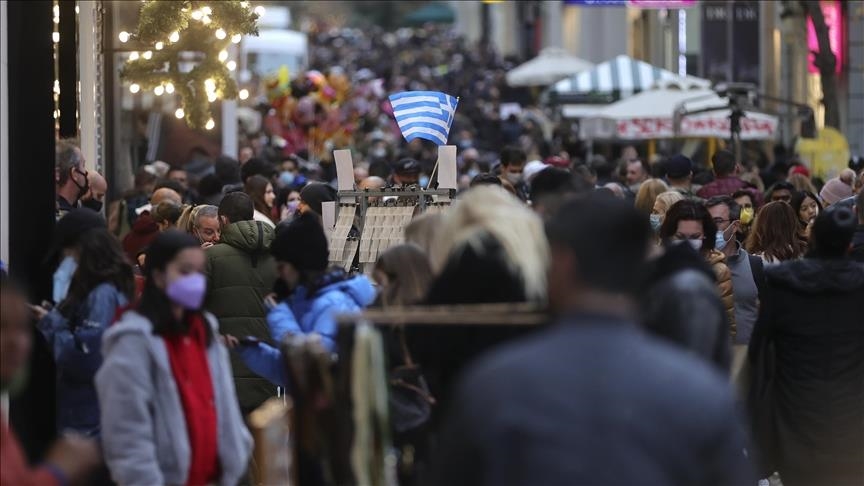ATHENS
Pensioners Kostas and Vicky in a northern Athens suburb have piled up firewood for the coming cold days.
Their house on the outskirts of Athens, close to the Parnitha Mountains, gets quite cold in the winter.
Although they do have central heating, Kostas said, “for now we will stick to wood, and wait and see how the weather will be.”
“I don’t know how things will go but we have to be prepared and not wait for the last minute, but I am worried as firewood has also gone up since last year,” he told Anadolu.
After the rise in the price of electricity and fossil fuels, firewood appears to be taking a turn, as demand hit red, according to retailers, and consumers are flocking to buy large quantities before prices rise again.
Firewood increased almost 30% compared to the same period last year but residents turn to it to avoid oil and natural gas, which are skyrocketing.
In some cases, the purchase of a cubic meter of wood can cost up to €180 ($191), while in 2021 it ranged from approximately €100 to €130.
The weather has been mild in Athens so far, leaving residents with hope that the use of petrol and other heating products will be used less than last year.
But there is a concern that things will not last long.
For Pheadra Bazina and her mother, Kitty Bazina, the situation is worse. They live in different houses far apart. The younger Bazina is an animal activist and uses her car a lot.
“I was extremely shocked when I saw the price of petrol climb so high. In the past, I needed about €45 to fill up my car but now I pay €60. It’s insane,” she said.
“I rescue stray animals,” she said. “So, I need a lot of pet food. In the past few months, the price of cat food has increased so much that eventually it will become financially unbearable to care for these animals.”
Her mother, who lives in a big house 30 minutes outside Athens, said the price of heating petrol has gone up so much that it is impossible for her to turn on the heat for more than two hours per day. “I am a pensioner. I am finding it very hard to keep up with these price rises. I am very worried. How am I going to make it through the winter?”
Price hikes
Prices have gone up almost on all essential goods and despite the government’s efforts to ease the burden on consumers, the load is heavy.
The market pass that the conservative government of Kyriakos MItsotakis is planning to introduce in February has left citizens concerned.
About 53% of citizens believe the market pass, a measure for subsidizing 10% of food purchase expenses, will probably or definitely not help to deal with surging prices, while 39% said it will probably or definitely help.
Fotini Santorinaiou who owns a dance school is concerned with the situation and her family feels insecure, she told Anadolu.
“Everything has become so expensive and as a family, we have a problem with how we would deal with our expenses and as a dance school we are in distress if the students will continue to enroll cause we don’t know if the parents will able to afford the tuition for lessons,” she said.
The insecurity is ongoing, said Santorinaiou, since the first financial crisis. It eased a bit, however, with the emergence of the coronavirus pandemic “it all started again and now this,” she said, referring to energy and consumer goods price hikes.
Despite the easing of the consumer price index, Greek households continue to pay more for goods, according to the country’s statistical authority.
The agency said last year Greek households paid €76. In 2023, they pay about €94, or 23% more, for almost the same items.
Prices have gone up on almost everything from milk, eggs and bread to stationery and cleaning products, with many items reaching a double-digit increase, said the agency.
A liter of fresh milk costs €1.87, up from €1.38. For spaghetti, the increase is 38.1%; feta cheese cost 21% more, while branded toilet paper has increased 69%, making it almost unaffordable.
Christina M., mother of two girls and a martial arts instructor, said the difference in prices is evident in her wallet and in the amount of things she buys.
“As much as you buy, the refrigerator continues to be empty as well as my wallet,” she told Anadolu, adding that the housewife’s basket — an initiative for lower-priced essential goods, does not exist.
Many consumers complained the initiative is misleading as products are either in smaller quantities or not the regular brands consumers buy.
A paradox also exists that Greece is self-sufficient and exports products, according to Eurostat.
An example is yogurt, whose price has increased 26.6% in Greece in the last 12 months with an average of 23.6% in the EU.
With all the increases in the prices of goods, the purchasing power has fallen, especially for low-income households.
The worse scenario is the price rally will not stop. On the contrary, it will continue until the middle of 2023, according to reports.

